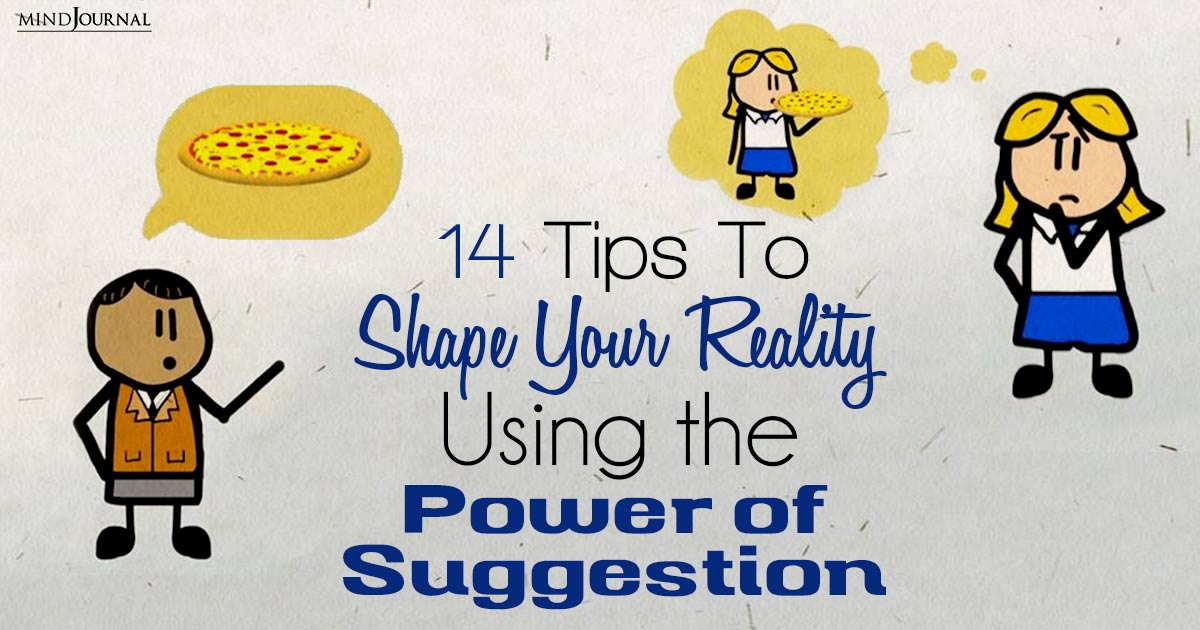Have you ever experienced a situation where the power of suggestion influenced your thoughts, decisions, or actions?
Perhaps a friend recommended a book, and you found yourself engrossed in its pages. Or maybe you were persuaded to try a new restaurant and ended up discovering your new favorite cuisine. These instances demonstrate how a simple suggestion can shape our perceptions, beliefs, and behaviors in ways we may not even realize.
Let’s explore what is the power of suggestion, how it can impact our lives and how to use the power of suggestion. So, fasten your seatbelts as we embark on a journey to uncover the hidden potential within us all.
What is The Power of Suggestion?
The power of suggestion refers to the ability to influence someone’s thoughts, feelings, or behaviors through subtle cues, language, or nonverbal communication.
It is a phenomenon deeply rooted in human psychology, where our minds are susceptible to external influences and can be shaped by the suggestions we receive.

So what is the power of suggestion? The power of suggestion is rooted in the human mind’s susceptibility to external influences. Our brains are wired to process information and respond to stimuli from our surroundings.
Related: 10 Powerful Psychology Tricks You Can Use To Influence People
Suggestion, in simple terms, is the act of influencing someone’s thoughts, feelings, or behaviors through subtle cues, language, or nonverbal communication. It can be both explicit, like a direct command, or implicit, embedded within a conversation or a suggestion disguised as a piece of advice.
Harnessing the Power of Positive Suggestion
Positive suggestions can have a profound impact on our lives, allowing us to overcome obstacles, develop new skills, and achieve our goals. When we receive positive suggestions, our minds become more receptive and open to new possibilities.
For example, if someone consistently suggests that you have the ability to excel in a particular field, it can boost your self-confidence and motivate you to pursue that path.
The Power of Negative Suggestion
Just as positive suggestions can influence us for the better, negative suggestions can have detrimental effects. Negative suggestions can breed self-doubt, hamper our progress, and create a self-fulfilling prophecy.
For instance, if someone repeatedly suggests that you are incapable of succeeding in a task, you may begin to doubt your abilities and ultimately fail to reach your full potential.
The Role of Self-Suggestion
Self-suggestion, also known as auto-suggestion, is a powerful tool that allows us to influence our own thoughts, behaviors, and outcomes. By consciously directing our thoughts and repeating positive affirmations, we can rewire our subconscious mind and shape our reality.
Self-suggestion can be used to overcome fears, boost confidence, improve performance, and cultivate a positive mindset.
Related: 8 Powerful Habits of Profoundly Influential People
The Influence of Suggestions on Advertising
Advertising is a prime example of how the power of suggestion is leveraged to influence consumer behavior. Advertisers employ persuasive techniques, such as captivating visuals, catchy slogans, and endorsements, to plant suggestions in our minds.
These suggestions can create desires, shape our preferences, and influence our purchasing decisions. Understanding the tactics used in advertising can help us become more aware consumers and make informed choices.
The Power of Suggestion in Hypnosis
Hypnosis is a state of heightened suggestibility where individuals become more receptive to suggestions. It has been used for centuries to address various issues, from breaking bad habits to managing pain and improving performance.
During hypnosis, a trained practitioner guides individuals into a relaxed state and introduces positive suggestions that can help reframe beliefs, overcome phobias, and promote personal growth.
The Power of Suggestion in Personal Relationships
Suggestion plays a significant role in our personal relationships, shaping the dynamics and interactions with others. Through subtle suggestions, we can influence the behavior and emotions of those around us.
However, it is essential to use this power responsibly and ethically, ensuring that suggestions are for the betterment of both parties involved.

Overcoming the Power of Negative Suggestion
Negative suggestions, whether from external sources or our own self-talk, can hinder our progress and limit our potential. By cultivating self-awareness, challenging negative thoughts, and surrounding ourselves with positive influences, we can neutralize the power of negative suggestion and create a more empowering mindset.
Related: 10 Most Popular Psychological Persuasion Theories To Influence People
Ethical Considerations
While the power of suggestion can be a potent tool for personal growth and influence, it is crucial to exercise it ethically and responsibly. Manipulating or coercing others through suggestion is unethical and can have harmful consequences.
It is essential to respect others’ autonomy and ensure that suggestions are aligned with their best interests.
Now that we know what is the power of suggestion, let us explore how to use the power of suggestion to improve our lives and help others to get better.
How to Use the Power of Suggestion: 14 Effectual Ways
To effectively use the power of suggestion, it is important to understand the following principles:
1. Create a Positive Atmosphere
When attempting to use the power of suggestion, it is crucial to create a positive and supportive environment. People are more receptive to suggestions when they feel comfortable, respected, and valued.
Establishing rapport and trust with the person you intend to influence is essential for the power of suggestion to be effective.
2. Be Specific and Clear
The power of suggestion is most effective when the suggestion is specific and clear. Vague or ambiguous suggestions can lead to confusion or resistance. Ensure that your suggestions are concise, easily understood, and leave no room for misinterpretation.
3. Use Positive Language
Positive suggestions tend to be more influential than negative ones. Frame your suggestions in a positive light, focusing on the desired outcome rather than what should be avoided.
For example, instead of saying, “Don’t be nervous,” say, “Stay calm and confident.”
4. Employ Visual and Imagery Techniques
Visual and imagery techniques can enhance the power of suggestion. Use vivid and descriptive language to paint a mental picture of the desired outcome. Encourage the person to imagine themselves achieving the desired result, engaging their senses and emotions in the process.
5. Repeat and Reinforce
Repetition is a powerful tool when it comes to suggestions. Repeating a suggestion multiple times can help reinforce it in the person’s mind and increase its impact.
However, it is important to strike a balance and avoid excessive repetition, as it may come across as manipulative or insincere. This is how to use the power of suggestion.
6. Timing is Key
The timing of your suggestions can significantly influence their effectiveness. Choose moments when the person is relaxed, open-minded, and receptive to suggestions. For instance, after a person has accomplished a small task successfully, they may be more open to suggestions related to taking on larger challenges.
7. Tailor Suggestions to Individual Preferences
Different individuals respond to suggestions in different ways. Pay attention to the person’s preferences, values, and beliefs to tailor your suggestions accordingly. Personalize the suggestions to resonate with their unique motivations and desires.
Related: Priming Psychology: How To Influence Someone’s Thoughts and Behaviors
8. Use Nonverbal Communication
Nonverbal cues, such as body language, tone of voice, and facial expressions, can enhance the power of suggestion. Maintain a confident and positive demeanor, and use gestures or subtle cues that align with your verbal suggestions.
Nonverbal communication can help reinforce the message and increase the impact of the suggestion.
9. Ethical Considerations
It is important to use the power of suggestion ethically and responsibly. Manipulating or coercing others through suggestion is unethical and can lead to negative consequences.
Always ensure that your suggestions are aligned with the person’s best interests, respect their autonomy, and do not infringe upon their rights or well-being.
10. Use Social Proof
Social proof is a powerful psychological phenomenon where people are more likely to adopt a belief or behavior if they see others doing the same.
To leverage social proof in suggestion, highlight examples or testimonials from individuals who have successfully achieved the desired outcome. By showcasing real-life examples, you can tap into the power of suggestion and encourage others to follow suit.
11. Employ Subtle Anchoring Techniques
Anchoring is a cognitive bias that occurs when an initial piece of information (the anchor) influences subsequent judgments or decisions. To use anchoring in suggestion, present a positive reference point or comparison that sets the desired expectation.
For example, if you want someone to believe that a certain price is reasonable, first mention a higher, unrealistic price, and then present the actual price as a favorable alternative.

12. Utilize the Power of Storytelling
Storytelling has a profound impact on human cognition and emotions. When using the power of suggestion, incorporate storytelling techniques to engage and captivate your audience.
Craft a compelling narrative that aligns with the desired outcome, highlighting individuals who have overcome similar challenges or achieved remarkable success. By weaving suggestions into a compelling story, you can inspire and motivate others to take action.
13. Leverage Priming
Priming is a psychological concept that influences perception and behavior by exposing individuals to specific stimuli. To use priming in suggestion, expose the person to relevant cues or information that primes their mind for a specific response or behavior.
This can be achieved through subtle reminders, symbols, or even specific scents that activate associated thoughts and emotions, making the desired suggestion more persuasive.
14. Encourage Visualization and Mental Rehearsal
Visualization and mental rehearsal are powerful techniques that leverage the imagination to create a mental representation of the desired outcome. Encourage individuals to vividly visualize themselves successfully achieving the suggested goal.
Guide them through a detailed mental rehearsal, involving sensory details, emotions, and a sense of accomplishment. This process helps align their subconscious mind with the suggestion, increasing the likelihood of it manifesting in reality.
By understanding and applying these principles, you can effectively use the power of suggestion to influence positive change, motivate others, and create a supportive and empowering environment.
Remember, the power of suggestion is a tool that should be used responsibly and with the intention of helping others reach their full potential.
Related: Decoding Referent Power Meaning: 8 Key Aspects and Its Historic Impact on Leadership Dynamics
Takeaway
The power of suggestion is a fascinating aspect of human psychology that can shape our thoughts, beliefs, and actions. By understanding and harnessing this power, we can unlock our potential, overcome limitations, and positively impact our lives and the lives of those around us.
Whether it’s using self-suggestion to cultivate a positive mindset or being mindful of the suggestions we receive from others, embracing the power of suggestion can lead to personal growth, enhanced relationships, and a more fulfilling life.
So, the next time you encounter a suggestion, remember its potential to shape your reality and choose wisely.
Frequently Asked Questions (FAQs):
What is the power of suggestion meaning?
The power of suggestion refers to the influence of subtle cues or ideas on shaping thoughts, behaviors, and beliefs.
Does the power of suggestion really work?
Yes, the power of suggestion can significantly influence perceptions, behaviors, and outcomes, often without conscious awareness.
What is the power of suggestion on yourself?
The power of suggestion on yourself involves using positive affirmations or mental imagery to influence beliefs, attitudes, and actions positively.










Leave a Reply